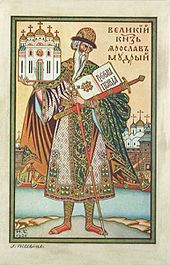Bolesław I's intervention in the Kievan succession crisis
But when Bolesław withdrew himself and his army from Kiev, Sviatopolk was unable to retain his position, being defeated by Yaroslav in the following year.[15] In the confusion resulting from the death of Vladimir Sviatopolk was able to seize power in Kiev, as Yaroslav was in the north, Mstislav in the south, Sviatoslav in the Derevlian land, Gleb in Murom and Boris on the aforementioned expedition against the Pechenegs.[12] According to the Primary Chronicle, Sviatopolk successfully arranged the murder of three of his brothers, Boris of Rostov, Gleb of Murom and Sviatoslav of the Derevlian lands.[12][17] When news of the fratricides reached Vladimir's fourth son, Yaroslav in Novgorod, he came to Kiev from the north with Novgorodians and Varangians.The best and most reliable account is from a chronicle by Bishop Thietmar of Merseburg, who obtained detailed information from Saxon knights fighting for Bolesław.[6] A third source is the Gesta principum Polonorum, a semi-legendary ode to the early Polish dukes written in the 1110s by the Benedictine monk Gallus'.The narrative of Bolesław's invasion is almost entirely dependent upon the account of Thietmar:"We may not keep silent regarding the sad and harmful events that occurred in Russia."[23][24] Probably after concentrating his forces during June, in July Bolesław led his troops to the border - the banks of the Southern Bug River, near one of the settlements of the Volhynia region.Thietmar's near-contemporary account offered the following: The Poles provoked the enemy into fighting and, with unexpected success, drove them from the river bank which they were supposed to defend.[3] At Boleslav's instigation, the very strong city of Kiev was disturbed by the constant attacks of hostile Pechenegs and severely weakened by fire.[28] The entering forces, led by Bolesław, were ceremonially welcomed by the local archbishop and Vladimir's family:[28] On 14 August, the city received Boleslav and Sventipolk, its long-absent lord.[29] Bolesław sent his German and Hungarian mercenaries home after Sviatopolk was re-established on the Kievan throne, "the populace" having "flocked to him" and having "appeared loyal".The Primary Chronicle alleges that as the result of Polish plundering, Sviatopolk ordered "that any Lyakhs [i.e. Poles] found in the city should be killed".[6][28][36] Bolesław's main motivation, according to the interpretations of modern historians, was to regain the Cherven Towns for his patrimony, while at the same time aiding his kinsman, to whom he had an obligation.[29] As Bolesław was involved in a conflict with Holy Roman Emperor Henry II, he did not intervene on behalf of his son-in-law when he was deposed and instead signed a pact with Yaroslav, who had successfully regained the throne.Although he lost control of Kiev, Bolesław succeeded in keeping the Cherven Towns captured by Vladimir the Great in 981; he was crowned King of Poland in 1025.



Kievan succession crisis of 1015–1019Kievan Rus'Cherven TownsDuchy of PolandKingdom of HungaryBolesław I the BraveSviatopolk IYaroslav IWars between Piast Poland and Kievan Rus'2nd 10181069–1071SviatopolkYaroslavgrand princely title of KievPolandBolesław Iruler of KievVladimir IRed RutheniaVladimir's daughtersBoris and GlebappanageThietmar of MerseburgReinbernKołobrzegCatholicfratricidesNovgorodVarangiansLyubechGerman KingdomTreaty of BautzenPrimary ChronicleNestor the ChroniclerGesta principum PolonorumGallus'Ivan BilibinRówneRafał JaworskiPechenegsknightsSouthern BugVolhyniaBattle of the River BugGolden GateSzczerbiecJan MatejkoarchbishopVladimir's familychurch of St SophiaPolish coronation weaponGolden Gate of KievLyakhsconcubineMoses the HungarianBolesław IIHoly Roman EmperorHenry IIVladimir the GreatKing of PolandOxford University PressGallus AnonymusKyiv Caves PatericonFranklin, SimonShepard, JonathanGrekov, BorisJaworski, RafałRzeczpospolitaMówią WiekiMartin, JanetKostomarov, Nikolay (Mykola)Polish wars and conflictsEarly modern warfareHistory of the Polish ArmyHistory of Polish intelligence servicesList of wars involving PolandMilitary of the Polish–Lithuanian CommonwealthPolish Armed ForcesWarfare in Medieval PolandPiast PolandPolish–Veletian WarBattle of CedyniaGerman–Polish War (1003–1018)German–Polish War (1028–1031)Miecław's RebellionBohemiaSiege of GłogówGalicia–Volhynia WarsFirst Mongol invasion of Poland (1240/41)Second Mongol invasion of Poland (1259/60)Third Mongol invasion of Poland (1287/88)Battle of LegnicaJagiellon PolandPolish–Teutonic warsTeutonic takeover of Danzig (Gdańsk)Polish–Teutonic War (1326–1332)Battle of PłowceGreat WarBattle of GrunwaldHunger War (1414)Gollub War (1422)Polish–Teutonic War (1431–1435)Thirteen Years' WarWar of the PriestsPolish–Teutonic War (1519–1521)Władysław the White's rebellionLithuanian Civil War (1432–1438)Battle of Grotniki1444 war against the OttomansBattle of VarnaMoldavian campaign (1497–1499)Polish–Lithuanian–Muscovite War (1512–1522)Battle of OrshaPolish–Lithuanian–Muscovite War (1534–1537)CommonwealthPolish–Swedish warsLivonian Warcampaign of Stephen BáthoryNorthern Seven Years' War (1563–1570)War against SigismundBattle of StångebroPolish–Swedish War of 1600–1629Polish–Swedish War of 1600–1611Battle of KircholmPolish–Swedish War of 1617–1618Polish–Swedish War of 1621–1625